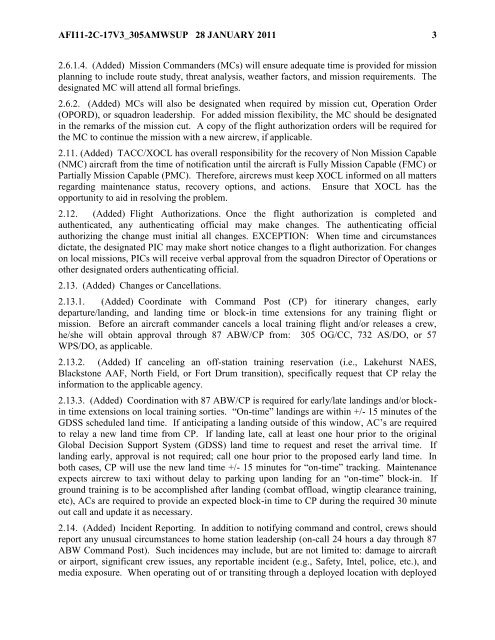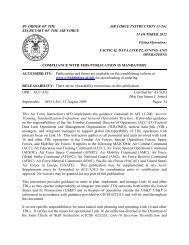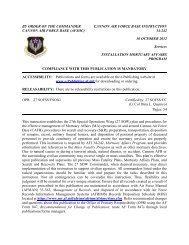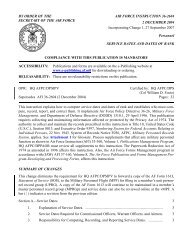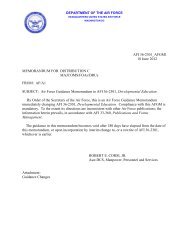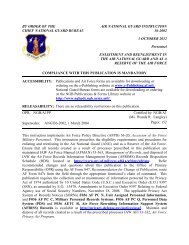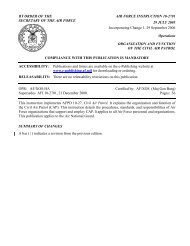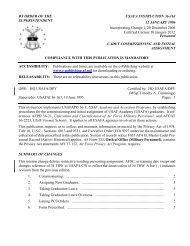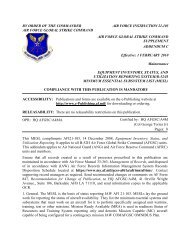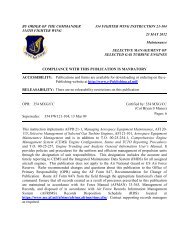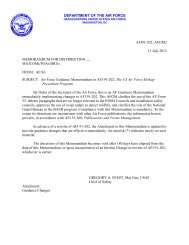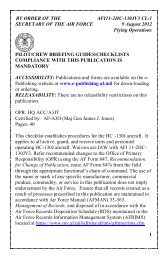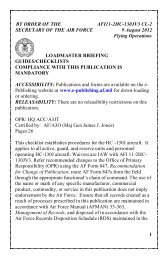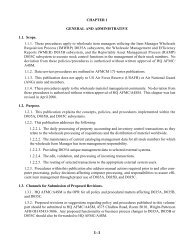BY ORDER OF THE COMMANDER 305TH AIR MOBILITY WING ...
BY ORDER OF THE COMMANDER 305TH AIR MOBILITY WING ...
BY ORDER OF THE COMMANDER 305TH AIR MOBILITY WING ...
Create successful ePaper yourself
Turn your PDF publications into a flip-book with our unique Google optimized e-Paper software.
AFI11-2C-17V3_305AMWSUP 28 JANUARY 2011 3<br />
2.6.1.4. (Added) Mission Commanders (MCs) will ensure adequate time is provided for mission<br />
planning to include route study, threat analysis, weather factors, and mission requirements. The<br />
designated MC will attend all formal briefings.<br />
2.6.2. (Added) MCs will also be designated when required by mission cut, Operation Order<br />
(OPORD), or squadron leadership. For added mission flexibility, the MC should be designated<br />
in the remarks of the mission cut. A copy of the flight authorization orders will be required for<br />
the MC to continue the mission with a new aircrew, if applicable.<br />
2.11. (Added) TACC/XOCL has overall responsibility for the recovery of Non Mission Capable<br />
(NMC) aircraft from the time of notification until the aircraft is Fully Mission Capable (FMC) or<br />
Partially Mission Capable (PMC). Therefore, aircrews must keep XOCL informed on all matters<br />
regarding maintenance status, recovery options, and actions. Ensure that XOCL has the<br />
opportunity to aid in resolving the problem.<br />
2.12. (Added) Flight Authorizations. Once the flight authorization is completed and<br />
authenticated, any authenticating official may make changes. The authenticating official<br />
authorizing the change must initial all changes. EXCEPTION: When time and circumstances<br />
dictate, the designated PIC may make short notice changes to a flight authorization. For changes<br />
on local missions, PICs will receive verbal approval from the squadron Director of Operations or<br />
other designated orders authenticating official.<br />
2.13. (Added) Changes or Cancellations.<br />
2.13.1. (Added) Coordinate with Command Post (CP) for itinerary changes, early<br />
departure/landing, and landing time or block-in time extensions for any training flight or<br />
mission. Before an aircraft commander cancels a local training flight and/or releases a crew,<br />
he/she will obtain approval through 87 ABW/CP from: 305 OG/CC, 732 AS/DO, or 57<br />
WPS/DO, as applicable.<br />
2.13.2. (Added) If canceling an off-station training reservation (i.e., Lakehurst NAES,<br />
Blackstone AAF, North Field, or Fort Drum transition), specifically request that CP relay the<br />
information to the applicable agency.<br />
2.13.3. (Added) Coordination with 87 ABW/CP is required for early/late landings and/or blockin<br />
time extensions on local training sorties. “On-time” landings are within +/- 15 minutes of the<br />
GDSS scheduled land time. If anticipating a landing outside of this window, AC’s are required<br />
to relay a new land time from CP. If landing late, call at least one hour prior to the original<br />
Global Decision Support System (GDSS) land time to request and reset the arrival time. If<br />
landing early, approval is not required; call one hour prior to the proposed early land time. In<br />
both cases, CP will use the new land time +/- 15 minutes for “on-time” tracking. Maintenance<br />
expects aircrew to taxi without delay to parking upon landing for an “on-time” block-in. If<br />
ground training is to be accomplished after landing (combat offload, wingtip clearance training,<br />
etc), ACs are required to provide an expected block-in time to CP during the required 30 minute<br />
out call and update it as necessary.<br />
2.14. (Added) Incident Reporting. In addition to notifying command and control, crews should<br />
report any unusual circumstances to home station leadership (on-call 24 hours a day through 87<br />
ABW Command Post). Such incidences may include, but are not limited to: damage to aircraft<br />
or airport, significant crew issues, any reportable incident (e.g., Safety, Intel, police, etc.), and<br />
media exposure. When operating out of or transiting through a deployed location with deployed


